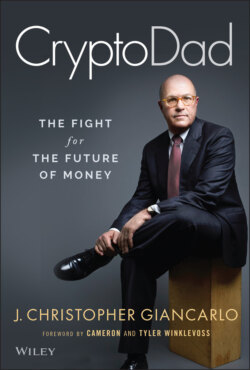Читать книгу CryptoDad - J. Christopher Giancarlo - Страница 33
The Layout
ОглавлениеThe US government formed administrative agencies to regulate commercial activity in the late 1800s, with the creation of the Interstate Commerce Commission. Applying powers delegated by Congress, these agencies publish rules and regulations; determine whether laws, rules, or regulations have been broken in particular cases; and impose fines and other sanctions on transgressors.
To perform these functions, Congress has conferred upon these agencies both quasi-legislative and quasi-judicial powers. They can issue licenses, set rates, and shape or even outlaw business practices.
Some agencies are federal executive departments, like, say, the Department of Transportation or Department of Agriculture. Other agencies exist outside the executive departments. The latter are referred to as independent agencies, because they report to both legislative and executive branches of government and the president's power to dismiss the agency head or its commissioners is limited. This independent structure insulates the agency from the political winds that sweep over Washington. The best-known independent agencies are probably the Federal Reserve Board, the Federal Communications Commission, the Federal Trade Commission, and the CFTC's sister agency, the Securities and Exchange Commission.
The Commodity Futures Trading Commission is another independent agency. Though less well known, it is of critical importance to the stability and prosperity of global financial markets. It was established in 1974 on the initiative of some visionary leaders of the Chicago commodity futures exchanges. The new agency assumed responsibility for regulating commodity futures markets—a role that, from the 1920s1 until then, had been performed by the Department of Agriculture. The CFTC operates under the statutory framework of the Commodity Exchange Act (CEA),2 a law that was originally passed in 1936 but has been amended several times since.
The CFTC is composed of five commissioners who serve staggered five-year terms. They are chosen by the president and confirmed by the Senate. No more than three of the five commissioners can be of the same political party. The commission is a creation of Congress, which has delegated power to it. The delegation is necessary because derivatives markets are so large, vast, and ever-changing that close scrutiny is necessary. Congress does not have the time or expertise to exercise daily oversight over them. So it delegated authority to the commission, which the commission is to wield in a fashion shielded from the expediencies of short-sighted politics.
The US derivatives markets—regulated by the CFTC—are the world's largest, most developed, and most influential. They are relatively unmatched in their depth and breadth. They provide deep pools of trading liquidity at low transaction cost and with minimal friction, and facilitate participation by a vast and diverse array of global counterparties. They are also some of the world's fastest growing and technologically innovative markets of any kind.
